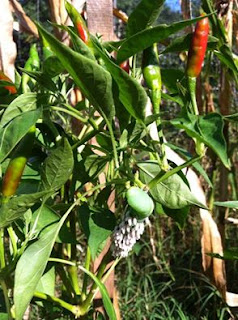The weather was hot, unseasonably so as much of 2016 has been, and attendance seemed a little low as compared to last year. There was a bit of room left in most of the classes I attended. Here's what was on offer, to tempt you to join us next year.
Going on Friday before the main day of the event, or Sunday after, offers a more laid-back experience. One can park at the Monticello Visitor's Center instead of riding a bus from Piedmont Community College. While there are no vendors, there are few competitors for the speakers' attention after a talk. This year, on Friday I drove up to attend an excellent workshop on raising onions and garlic (alliums to us plant geeks), offered by Ira Wallace, a writer and gardener with Southern Exposure Seed Exchange. She convinced me that by accident I'd done some things right with our garlic (such as not over fertilizing the soil) and provided valuable advice for preparing a bed, advice that I plan to use for onions next year.
Our onion crop was a flop but I'll try again with a different perennial variety. From Ira I learned to harvest a little earlier than I have done for garlic, when one or two of the plants' green leaves are turning brown. Digging then insures that the bulbs will have sufficient skins over the cloves and not fall apart. I will also cut and eat the scapes from our hardneck garlic, then be ready to harvest a few weeks later. This was all news to me.
We began to prepare the bed for our alliums this weekend, in order to plant in mid-to-late October. I plan to keep rotating so my garlic never repeats in the same beds for four years, five if possible.
My 2016 changes involve smothering all weeds in the allium bed under thick weedblock fabric for a month, then taking it up when I plant garlic and onions as I did last year, under 4-6 inches of straw. This technique works well for Ira. Already, with my haphazard approach in a raised bed, we harvested about 40 bulbs of garlic, almost enough for a year (we eat a LOT of garlic).
Next year I plan to follow our winter cover crop of hairy vetch, winter rye, and crimson clover (seeds went in this week and are sprouting) with Buckwheat going in for the Spring. Before our summer vacation, the wheat will be ready to scythe by hand and thresh. Connor's thresher is a grandchild with a plastic baseball bat and a sheet of plywood. She uses a fan to winnow the wheat, as she pours it from one bucket to another. Finally, the remainder of the harvest makes excellent locally sourced straw.
Given how much straw we use for our chickens' coops, I had better buy a plastic bat and hire a local kid to thresh.
For the second day of the festival I went to a really powerful talk about sustainable pest-remedies by Tanya L.K. Denckla, author of The Gardener's A-Z Guide to Growing Organic Food, as well as other books and articles. Tanya and I then exchanged ideas about the vagaries of soil and weather in Central VA; she lives just up the road "a piece," meaning 40 miles, from us. I plan to test some of her pest remedies on our squash bugs when I next grow squash (2018 season). This year we lost every single squash, despite our use of diatomaceous earth and other natural techniques such as floating row-covers and delayed planting!
Much of her advice would be a delight for the home gardener. Some simply will not work for our market-gardening operation, at least until I begin to remove weeds by some of the planting techniques and cover-crop ideas Connor advocates. I did notice this year that my Thai peppers had to fight much harder against weeds when I planted with recommended spacing. Next year, I'll go back to my 2015 method of closer planting and plant through heavy weed-block fabric. Last year I experienced some mortality because of reduced air circulation, but no plants toppled in storms and best of all, the deep shade under the the pepper plants stymied the growth of weeds.
Patience pays off. This weekend I saw two large worms covered with the larvae of parasitic wasps. We planted to attract beneficial insects this year, and it payed off. The picture below is nearly identical to one Denckla showed us, but it comes from my pepper patch.
The same day I also visited vendors and listened to Joel Salatin of Polyface Farms have an imagined dialog with Thomas Jefferson about being a productive and sustainable farmer. Even on a mountaintop, a place that Salatin said only a dreamer would try to run a farm business!
Except in spirit, I did not see Thomas Jefferson this year, but we had Naturalist William Bartram courtesy of someone's time machine. Bartram strode manfully past me as I waited, in vain, to hear a talk by food journalist Corby Kummer. Kummer, of The Atlantic and my favorite writer about food, was unable to be present for his talk. It was my only disappointment of the the 2016 Festival.
I should have chased down Bartram. Even in facsimile, I would like to pay homage to a writer we environmentalist should know better. He had a real sense of both the wonder and fragility of the New World's ecosystem. We need a bit more of what Bartram began and that continues every year at Monticello.






No comments:
Post a Comment